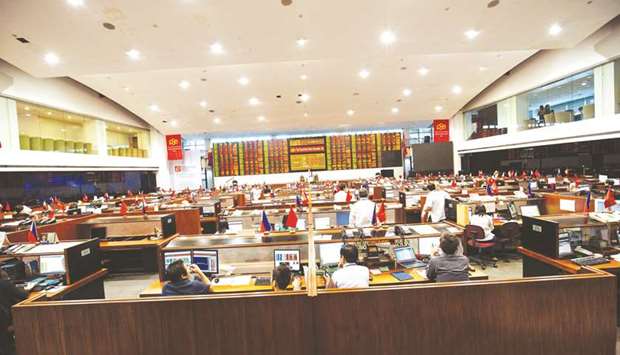The Philippine Stock Exchange Property Index has climbed 23% this year as investors became more sanguine about President Rodrigo Duterte’s pivot to China and his US counterpart’s insular approach to trade, which could hurt outsourcing companies. The measure now commands the highest premium since 2013 over the stock benchmark, which is up 16%.
Driving demand for houses and office space is an accelerating economy, rising remittances from Filipinos abroad and government incentives to draw offshore businesses.
Complimenting that is lawmakers’ plan to lower some taxes and boost spending on roads and bridges, a move cheered by investors.
“Property stocks will continue to move higher and even outperform as the sector continues to grow with the economy,” said Fitzgerald Aclan, who helps manage about $20bn at BDO Unibank Inc as the head of equity investments. “There are still some property companies that offer good value and attractive potential upside.”
The fund manager, whose BDO Sustainable Dividend Fund has gained 16% this year, pointed to Ayala Land Inc. Its shares have increased about a third in value in 2017 but are still trading at a price-to-earnings ratio that’s 14% lower than the five-year average.
Aclan said he turned “bullish” on the sector this year, cutting holdings of consumer and energy companies to buy real-estate shares.
Perception has changed, according to COL Financial Group, amid an increase in home bookings and new residential developments, while the office segment is benefiting as the government lures overseas outsourcing companies and those that run gambling websites.
“It doesn’t look like this will be over anytime soon,” said Richard Laneda, an analyst at COL. “Sentiments have improved.”
Earnings at Philippine developers have been climbing to records as Filipinos working and living abroad send money back home while outsourcing companies continue to expand.
Duterte’s plan to reduce income taxes and spend $166bn on infrastructure has led to a better economic outlook. Gross domestic product is forecast to expand 6.5% annually in the next three years after averaging 6.4% between 2014 and 2016.
To be sure, the rally is facing hurdles such as a government plan to scrap tax incentives that subsidise housing for some people.
Demand could also be hurt by rising borrowing costs and increasing prices that make affordability an issue, according to Astro del Castillo, managing director at First Grade Finance Inc. “Property looks attractive, but it pays not to be aggressive, particularly when interest rates are inching higher,” del Castillo said.
The impact of reversing exemptions on value-added tax for low-cost homes should be minimal because of the “huge” housing gap, BDO’s Aclan said.
The Philippines has a 5.7mn housing backlog, according to Vista Land & Lifescapes Inc.
“There will be future headwinds like rising interest rates but there’s always natural demand as a function of a growing economy,” said Aclan, whose top picks in the sector include Ayala Land, Megaworld Corp and Filinvest Land Inc. “As long as there’s economic growth, the whole sector isn’t going to suffer.”
Ayala Land rose 1.2% to a record close on Monday, bucking a 0.3% decline in the Philippine Stock Exchange Index. Filinvest Land advanced 1.7%, its first gain in five trading days, while Megaworld added 0.4%, halting a two-day loss.

